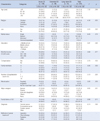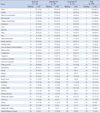Abstract
Purpose
This study was to compare distress and body image according to the stages of cancer survivorship in patients with gynecological cancer.
Methods
The subjects were 231 patients who visited for treatment or follow-up care at a university medical center in a city, Korea. These participants were divided into three groups based on the stages of cancer survivorship. The data were collected from November, 18, 2010 to January, 28, 2011 with the use of a structured questionnaire which measured the distress thermometer (DT) and problem list (PL), and body image.
Results
Distress scores were not significantly different among three stages of cancer survivorship, but the patients of acute cancer survival experienced the distress of 4.50 point of moderate level (DT>4). The problem list of distress score was significantly higher in the acute cancer survival than long-term cancer survival (F=3.04, p=.048). The score of body image was significantly lower in the acute cancer survival stage than long-term cancer survival (F=3.69, p=.026).
References
1. Ministry of health & welfare, Korea Central Cancer Registry, National Cancer Center. Annual report of cancer statistics in Korea in 2010. Seoul: 2012.
2. Kim JH. Development of recommendation for distress management toward improvement of quality of life in cancer patients. Seoul: Ministry of Health & Welfare;2009.
3. National Comprehensive Cancer Network. Clinical practice guidelines in oncology-v.1.2007. distress management: version 1. 2007.
4. Hamer M, Chida Y, Molloy GJ. Psychological distress and cancer mortality. J Psychosom Res. 2009; 66:255–258.

5. Park JS, Oh YJ. Factors influencing on quality of life in gynecological cancer patients. Korean J Adult Nurs. 2012; 24(1):52–63.

6. Jo JM. The needs of cancer patients for rehabilitation services [dissertation]. Suwon: Sungkyunkwan Univ.;2010.
7. Mahon SM. Tertiary prevention: implication for improving the quality of life of long-term survivors of cancer. Semin Oncol Nurs. 2005; 21:260–270.

8. Lee JY, Choi SM. Quality of life in gynecological cancer patients during chemotherapy. Korean J Women Health Nurs. 2007; 13(4):290–298.

9. Chun N. Predictors of sexual desire, arousal, lubrication, orgasm, satisfaction, and pain in women with gynecologic cancer. J Korean Acad Nurs. 2010; 40(1):24–32.

10. Sacerdoti RC, Lagana L, Koopman C. Altered sexuality and body image after gynecological cancer treatment: how can psychologists help? Prof Psychol Res Pr. 2010; 41(6):533–540.

11. Hawighorst-Knapstein S, Fusshoeller C, Franz C, Trautmann K, Schmidt M, Pilch H, et al. The impact for genital cancer on quality of life and body image-results of a prospective longitudinal 10 year study. Gynecol Oncol. 2004; 94(2):398–403.

12. Brunner LS, Suddarth DS. Text book of medical-surgical nursing. 5th ed. Piladelphia, London, tronto: J.B. Lippincott Company;1982.
13. Park JS, Jang SY. A study on the predictive factors of sexual function in women with gynecologic cancer. Asian Oncol Nurs. 2012; 12(2):156–165.

14. National Cancer Institute Office of Cancer Survivorship. About cancer survivorship research: survivorship definition. Accessed June 29, 2012. Available from: http://cancercontrol.cancer.gov/ocs/definitions.html.
15. Mullan F. Seasons of survival: reflection of a physician with cancer. N Engl J Med. 1985; 313(4):270–273.

16. Zebrack BJ, Chesler MA. Managed care: The new context for social work in health care-implications for survivors of childhood cancer and their families. Soc Work Health Care. 2000; 31(2):89–103.
17. Lim JW, Han IY. Comparison of quality of life on the stage of cancer survivorship for breast and gynecological cancer survivors. Korean J Soc Welf. 2008; 60(1):5–27.

18. Baik OM, Lim JW. Social support in korean breast and gynecological cancer survivors: comparison by the cancer stage at diagnosis and the stage of cancer survivorship. Korean J Fam Welf. 2011; 32(6):5–35.
19. Lee ES, Park JS. The comparison of health promotion behavior, post traumatic growth and quality of life according to stages of survivorship in patients with female genital neoplasm. Korean J Adult Nurs. 2013; 25(3):312–321.

20. National Comprehensive Cancer Network. Clinical practice guidelines in oncology: Distress management. Accessed June 7, 2011. Available from: http://www.nccn.org/professionals/physician_gls/PDF/distress.pdf.
21. Jeong GH. Body image and depression in post-hystrectomy patients [dissertation]. Seoul: Ewha Womens Univ.;1998.
22. Kwon EJ, Yi MS. Distress and quality of life in brest cancer survivors in Korea. Asian Oncol Nurs. 2012; 12(4):289–296.

23. National Comprehensive Cancer Network. Distress management guideline 2013. Accessed September 30, 2013. Available from: http://www.healthy.ohio.gov/~/media/HealthyOhio/ASSETS/Files/comprehensive%20 cancer/CCLC/NCCN-Distress.ashx.
25. Meraviglia MG. The effects of spirituality on well-being of people with lung cancer. Oncol Nurs Forum. 2004; 31:89–94.

26. Brown KW, Levy AR, Rosberger Z, Edgar L. Psychological distress and cancer survival: a follow-up 10 years after diagnosis. Psychosom Med. 2003; 65:636–643.
27. Holzner B, Kemmler G, Kopp M, Moschen R, Schweigkofler H, Dunser M. "Quality of life in breast cancer patients-not enough attention for long-term survivors?". Psychosomatics. 2001; 42:117–123.

28. Molassiotis A, Chan CW. Fatigue patterns in chinese patient receiving chemotherapy. Eur J Oncol Nurs. 2001; 5(1):60–67.




 PDF
PDF ePub
ePub Citation
Citation Print
Print





 XML Download
XML Download